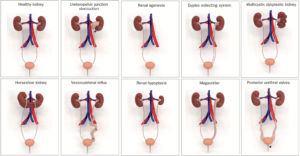
Pediatric kidney malformations are congenital anomalies affecting the structure and function of the kidneys in infants and children. These conditions can range from minor structural differences to significant malformations that impair renal function. Early diagnosis and appropriate management are crucial to ensuring optimal outcomes for affected children.
Common Types of Pediatric Kidney Malformations
- Horseshoe Kidney: This occurs when the two kidneys fuse together during fetal development, forming a U-shaped structure. While many individuals with horseshoe kidneys remain asymptomatic, some may experience urinary tract infections, kidney stones, or hydronephrosis due to impaired drainage.
- Pelviureteric Junction Obstruction (PUJO): PUJO is a blockage at the junction where the pelvis of the kidney meets the ureter, leading to impaired urine flow and potential kidney damage.
- Vesicoureteral Reflux (VUR): VUR is characterized by the backward flow of urine from the bladder into the kidneys, increasing the risk of urinary tract infections and potential kidney damage.
- Posterior Urethral Valves (PUVs): PUVs are obstructive flaps of tissue in the male urethra that can hinder urine flow, leading to bladder dysfunction and kidney damage if not treated promptly.
Diagnosis of Kidney Malformations
Early detection of kidney malformations is vital for effective management. Diagnostic approaches include:
- Prenatal Ultrasound: Many kidney anomalies are detected during routine prenatal ultrasounds, allowing for early intervention planning.
- Postnatal Imaging: After birth, imaging studies such as ultrasound, voiding cystourethrogram (VCUG), or magnetic resonance urography (MRU) provide detailed views of the urinary tract to confirm diagnoses.
- Functional Assessments: Tests like renal scintigraphy assess kidney function and drainage efficiency, guiding treatment decisions.
Management Strategies
Treatment plans are tailored based on the specific malformation and its severity:
- Observation: Minor anomalies without symptoms may only require regular monitoring to ensure normal kidney function.
- Medication: Conditions like VUR might be managed with prophylactic antibiotics to prevent infections.
- Surgical Intervention: Significant obstructions or functional impairments often necessitate surgical correction to restore normal urine flow and preserve kidney function.
Role of Pediatric Urologists
Specialized care from pediatric urologists is essential for managing these complex conditions. In Mumbai, Dr. Apoorva Kulkarni is the best pediatric urologist in Mumbai renowned for expertise in treating various urological disorders in children. Dr. Kulkarni offers comprehensive services, including minimally invasive surgeries and antenatal counseling, ensuring personalized care for each patient.
Pediatric kidney malformations require prompt diagnosis and individualized management to prevent long-term complications. Collaborating with experienced specialists, such as Dr. Apoorva Kulkarni in Mumbai, ensures that children receive the highest standard of care, promoting healthy development and quality of life.
